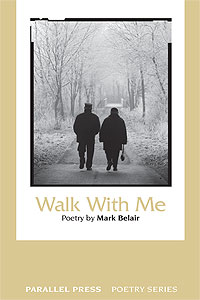Book Review
Mark Belair, Walk With Me, Parallel Press, 2012
by Lisa Vihos
Walk With Me by Mark Belair is a compelling meditation on life’s many passages. From a ride on the ferris wheel at age seven, when “the whole circular event feels like/some weird premonition” to the last afternoon of frenzied, secret love-making shared with a high school sweetheart before heading off to college, Belair masterfully captures in his poems the central emotional sting that is to be found in the moments when we grow and change. These moments are not ones we always take the time to articulate, but that’s what Belair does for us so well. While the circumstances may be born of or colored by his own experience, he manages to enlarge each poem to the just-right dimension whereby the reader, this reader, knows exactly what he is talking about at pretty much every turn. Take the opening stanza of the “The Lemon Square:”
In a white bag held
by my tight little fist
sat a lemon square—
tart, gooey paste
on a heavy crust
top glazed white—
bought for me by my mother
at Legere’s
Perhaps like Proust’s madeleine, we all have a secret treat that takes us back in time and represents our ancestry, our foibles, our pride. Belair certainly reminds us of those small things from the past that hold significance, whatever they may be.
This is a poet who consistently takes note of the otherwise unnoticeable. In “Underside,” we go with him as a young boy who crawls under the front porch to retrieve a football and comes face-to-face with a decaying field mouse. In the poem “Trash,” we help him place at curbside the bagged, meager belongings of a couple being evicted from their rental house. We get to look over his shoulder at their homemade pornographic Polaroids of each other, made at a less tenuous moment in life. In “Rescuer,” we sit with him at the hospital bed of his dying grandmother and we, too, want to attend to a stray whisker that sprouts from a mole on her chin that is driving him crazy with frustration and grief.
The poems are organized as “walks” through various places; some real, and some metaphorical. In the first series of poems, we go “Around the Countryside.” In the last series, we go “Over Uncertain Terrain.” Most all of the poems involve memories; some of childhood, some of young love, some of family life.
Reading his bio at the end of the book, we are not surprised to discover that Belair is not only a poet, but also a professional drummer who studied at the New England Conservatory of Music. He has recorded with jazz greats Bill Evans and Joe Lovano and has played with the New York Philharmonic and the Boston Symphony Orchestra. He is well-versed in both jazz and classical idioms. Thus his poems have a quiet rhythm to them that neither hits us over the head nor eludes us. His work has a steadiness to it that carries each poem to a fine and often surprising conclusion.
There is sadness and melancholy as told in the poem-story called “All I Knew” that tells of the life of the poet’s grandfather, also a drummer, who died young. But, along with the sorrows buried in a boy’s heart, there are occasional bursts of humor as well. I laughed out loud at the images he paints in the poem-story called “The Day Trip” in which a family of four heads out for a day at the beach, armed with “flip-flops / beach ball / beach chairs / beach blanket / towels / newspaper we’ll never get to read.” They make their way armed with so much stuff “like an ambulatory pop sculpture to a clear beach spot and / exhausted / drop it all.”
Belair’s spare use of language allows him to say much in few words. One of my personal favorites is the poem, “Fakers.”
I woke when the car stopped, but
faked sleepso my father
would carry me into the house.“He’s faking,” my big sister, having to walk
because no faker herself, crankily complained.But my father, not listening,
carried me in anyway,faking he didn’t know I was faking
because he liked to carry his boy.We two fakers,
hugging each other for real.
My immediate reaction upon finishing the last poem in Walk With Me, a poem called “Luminescence,” is that I would like to read more poems by Mark Belair. While he has been published extensively in numerous small journals, Walk With Me is his first chapbook. Based on the delicate and delicious precision of his words and the compelling nature of the stories he tells in his poetry, I am quite sure it will not be his last.
The poems of Lisa Vihos have appeared in numerous small journals and she has one Pushcart Prize nomination. She has two chapbooks, A Brief History of Mail (Pebblebrook Press, 2011) and The Accidental Present, just out from Finishing Line Press. She is an associate editor of Stoneboat literary journal and an occasional guest blogger for The Best American Poetry. She lives in Sheboygan.


